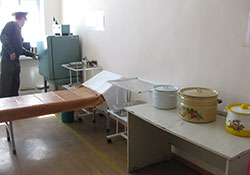WHO Health in Prisons Programme (HIPP)

WHO/Tina Kiaer
WHO established HIPP in 1995 is to support Member States in improving public health by addressing health and health care in prisons, and to facilitate the links between prison health and public health systems at both national and international levels. HIPP has since developed into an international movement to promote health in prison settings.
HIPP’s main activity is to give technical advice to Member States on the development of prison health systems and their links with public health systems and on technical issues related to communicable diseases (especially HIV/AIDS, hepatitis and tuberculosis), illicit drug use (including substitution therapy and harm reduction) and mental health.
As part of HIPP, WHO/Europe established a network of national counterparts and international partner organizations to liaise between WHO/Europe and Member States. The network currently includes 44 national counterparts, and meets once a year to discuss specific topics.
HIPP aims:
- to encourage cooperation and establish integrated work between public health systems, international nongovernmental organizations and prison health systems to promote public health and reduce health inequalities;
- to encourage prisons to operate within the widely recognized international codes of human rights and medical ethics in providing services for prisoners;
- to help reduce reoffending by encouraging prison health services to contribute fully to each prisoner’s rehabilitation, especially but not exclusively in relation to drug addiction and mental health problems;
- to reduce prisoners’ exposure to communicable diseases, thereby preventing prisons’ becoming focal points of infection; and
- to encourage all prison health services, including health promotion services, to reach standards equivalent to those in the wider community.



